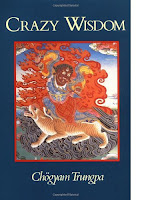Chögyam Trungpa Rimpoche (1939-1987) was a Tibetan Buddhist meditation master, scholar, and founder of the Shambhala tradition in the West. He was known for his unconventional and provocative teaching style, which included the notion of "crazy wisdom."
 |
| https://www.elephantjournal.com/ |
"Crazy Wisdom" refers to a teaching approach
that challenges conventional wisdom and societal norms. Trungpa believed that
enlightenment could not be attained through traditional, predictable, and
comfortable means but rather through direct, unfiltered experience and a
willingness to step beyond one's comfort zone. He encouraged his students to
embrace the full spectrum of human experience, including the messy and chaotic
aspects of life.
"Crazy Wisdom" is the idea that we should not shy
away from discomfort or the unknown. Trungpa's teachings encourage us to engage
with life fully, without clinging to rigid ideologies or seeking refuge in
familiar routines. This approach challenges us to step outside our comfort
zones, confront our own prejudices, and embrace the world with a sense of
wonder and curiosity. It's essential to note that Chögyam Trungpa's teachings
are not without controversy.

No comments:
Post a Comment